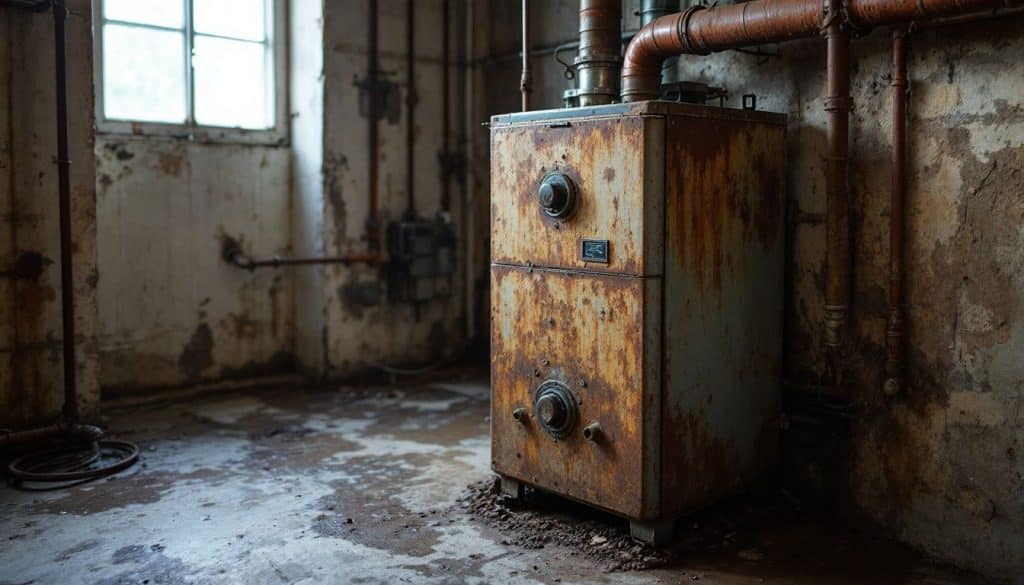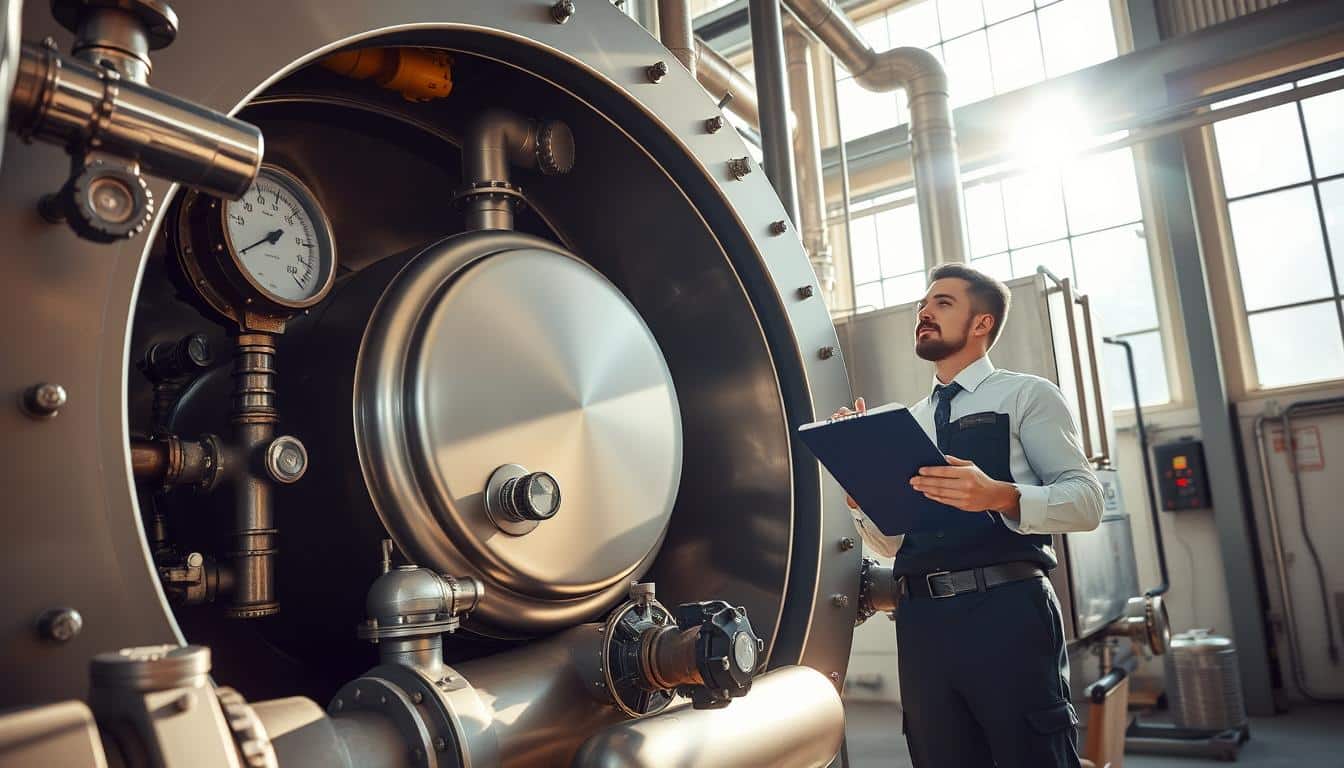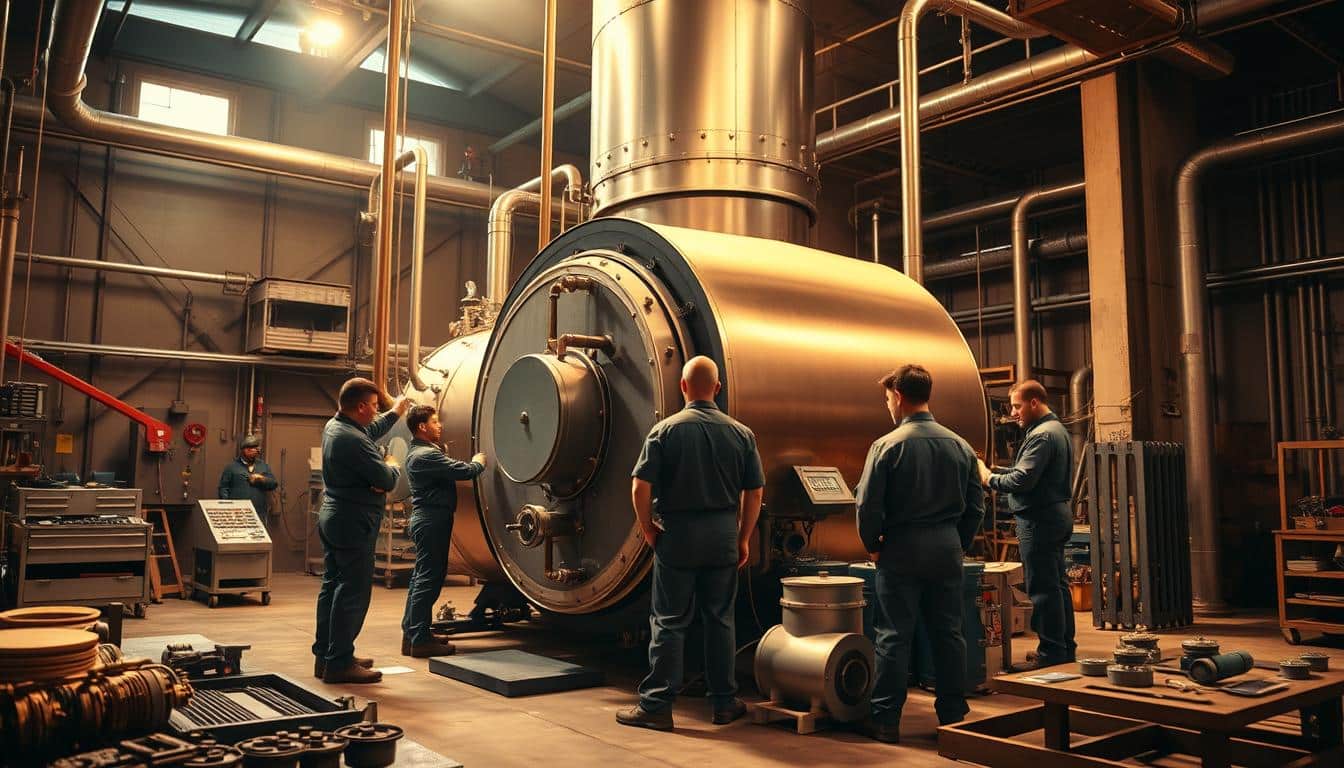Table of Contents
Are you wondering When Should I Replace My Boiler Instead of Repairing It? This is a common question for many. The wrong choice can lead to extra costs or discomfort when it’s cold.
We get it, choosing between comfort and budget is tough.
Did you know that boilers usually last 15-30 years? This can change based on how well they’re cared for and their type.
We’ve gathered important info to help you decide between repair or replacement. This guide will help you know when your boiler needs to be replaced. It will also cover factors to consider and why a heat pump might be a good choice.
Ready to dive in? Let’s go.
Key Takeaways
- Your boiler might need replacing if it’s over 15 years old, breaks down often, or if repair parts are hard to find. High fuel bills and slow heating could mean the boiler is too inefficient.
- Repairing your boiler is wise if it’s stil under warranty or if fixes cost less than half of a new one. Consider replacing when repairs add up to more than its value.
- Heat pumps can be a better choice for replacement because they save on energy bills, last longer, and are more efficient. Despite higher initial costs, they offer long-term savings and fewer breakdowns compared to traditional boilers.
- Hiring professionals like Raye-Van Enterprises Inc. means you get fast help when needed and can protect your investment with extended warranties. They make sure the job is done right, giving you peace of mind.
Signs Your Boiler Needs to be Replaced
A boiler may need a change when it shows certain warning signs. We should pay attention to age, breakdowns, and rising fuel bills.
Age of boiler
The age of our boiler is a key factor in deciding to replace it. Most boilers last about 15 to 30 years. If ours is over 15 years old, we should think about replacing it soon. An older boiler can be less efficient and may need more repairs.
We often notice that older boilers require frequent fixes. This can lead to higher maintenance costs and stress for us as homeowners or business owners. If the boiler’s age is matched with rising energy bills, it’s time for us to consider a replacement option.
Frequent repairs or breakdowns
Frequent repairs or breakdowns signal that our boiler needs attention. Each time we call for a repair, costs add up. If we face issues often, it points to bigger problems. We may spend more on fixing the boiler than on a new one.
Our old boiler might not warm our home efficiently anymore. It can also lead to higher fuel bills every month. Relying on an unreliable system only brings stress and discomfort. As homeowners and business owners, keeping track of these signs helps us decide if it’d be better to replace the boiler instead of repairing it over and over again.
Difficulty sourcing replacement parts
Finding replacement parts for old boilers can be tough. As a boiler ages, parts may stop being made. We face long waits or high costs when we need repairs. This adds stress and leads to rising heating expenses.
If sourcing parts becomes too challenging, it’s a clear sign our boiler needs replacing. A new heating system will provide better reliability and comfort. It also helps avoid the hassle of constant repairs and searches for hard-to-find parts.
Increasing fuel bills
When our fuel bills keep going up, it could mean our boiler is not working right. If we see these costs rising every month, it might be time to think about getting a new boiler instead of just fixing the old one.
An old or inefficient boiler uses more energy, which means higher bills.
A boiler that’s not working well can’t heat our spaces well. This means we waste more fuel and get less comfort at home or work. Watching our costs can help us figure out if it’s time for a new boiler instead of spending a lot on costly repairs again and again.
Slow heating
Slow heating is a clear sign that our boiler may need replacement. If it takes too long to warm up our home, we should take note. This could mean the system is struggling to work properly.
An old boiler often slows down as it nears the end of its lifespan.
Inconsistent warmth can lead to discomfort and rising energy bills. We might notice one room is hot while another stays cold. This uneven heating shows a problem in the system’s ability to distribute heat efficiently.
Looking into repair vs replacement options can help us decide if it’s time for an upgrade.
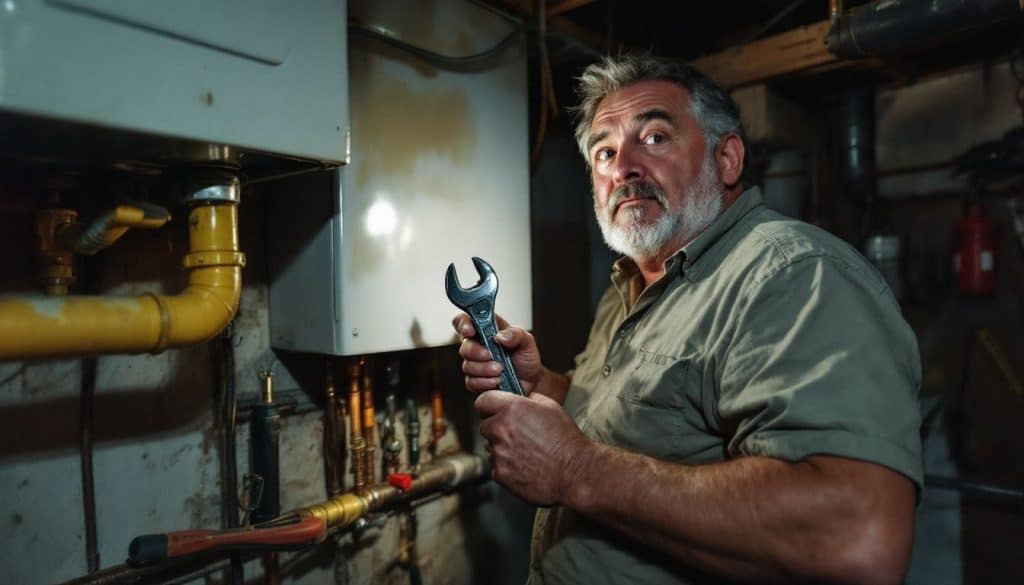
Inconsistent warmth
Inconsistent warmth means we might need a new boiler. If some rooms are warm and others are cold, it’s a sign of trouble. This could be due to old parts or system failures.
Our heating system should keep all rooms warm.
This problem often shows up in winter. We might keep adjusting the thermostat, but it doesn’t help. This makes our fuel bills go up as our boiler works harder.
Instead of just fixing it, thinking about boiler replacement could save money and make us more comfortable. Regular checks can prevent these issues. But if problems keep happening, it might be time for a new, efficient boiler.
Insufficient hot water
Not enough hot water is a big problem. Cold showers when we expect warmth are frustrating. This often happens with old and worn-out boilers. Boilers usually last 10 to 15 years.
If ours is older, it might not meet our needs anymore.
Fixing an old boiler can cost a lot. The cost of fixing an old boiler adds up quickly. Switching to a new system could save us money in the long run.
A heat pump is a smart choice for heating our homes. It ensures we have enough hot water every day without high bills or constant breakdowns.
Unusual noises or smells
Unusual noises or smells from our boiler are big warning signs. A banging or clanking sound means something is wrong inside. It could be loose parts or a failing system. Smells like gas or burning are serious dangers.
These signs might mean we need a new boiler.
Ignoring these signs can be dangerous. We should never ignore strange sounds or smells from our heating system. Regular checks help catch problems early. But strange noises and smells often mean it’s time for an upgrade, not just a repair.
Health concerns
Old boilers can be bad for our health. A failing unit might leak carbon monoxide. This gas is dangerous and can harm us. We must take this risk seriously.
Mold and mildew can grow with poor heating. This affects air quality in our homes or businesses. Allergies and breathing problems may increase for us and our loved ones. We need to act if we notice health concerns related to heating systems.
Factors to Consider: Repair or Replace
Deciding whether to repair or replace our boiler is important. We should think about cost, safety, and comfort.
Total cost
The total cost is a big factor in our decision. We need to consider the ongoing costs of repairs and maintenance. High maintenance costs can add up quickly, even for an old boiler.
If repairs cost more than a new boiler, we should think about replacing it.
We also need to think about energy efficiency. An old boiler uses more fuel, raising our bills. Investing in a new system, like heat pumps, can save money in the long run. These options often have lower operating costs and reduce fuel bills significantly over time.
Functionality
Functionality is key when thinking about our boiler. We need to ask if it keeps our home warm and comfortable. If it struggles to heat or takes too long, it’s a sign of trouble.
An old boiler might not work well anymore, leading to high fuel bills. This means we spend more money for less heat.
We should also think about how often we repair the boiler. Frequent repairs mean it may be time for a new one. Old parts can be hard to find, making repairs even tougher. Safety must come first in our homes and businesses, so if the boiler causes health risks or unusual noises, replacing it is wise.
Let’s keep comfort and safety as priorities!
Safety
Safety is a big worry for us, whether we own a home or a business. An old boiler can be very dangerous. It might leak carbon monoxide gas, which is bad for our health. We also fear boiler explosions because of faults or too much pressure.
If we hear unusual noises or smells from the boiler, it’s a warning sign.
Getting a new boiler means better safety features. Modern boilers are made with safety in mind. They have many shut-off systems and better insulation. This keeps our homes and loved ones safe from heating dangers.
Even regular maintenance checks on old models might not be enough. Sometimes, it’s safer to replace the boiler for everyone’s safety.
Comfort
Comfort is key for our homes and businesses. A struggling boiler can make us feel cold and uncomfortable. If we keep adjusting the thermostat, it might be time for a new one.
An old boiler can cause uneven heating. This means some rooms are too warm, while others are too cold.
Not having consistent hot water can mess up our daily routines. Frequent repairs mean we need a new system. Thinking about how much discomfort an unreliable boiler causes helps us make the best choice for our well-being.
Decision-Making Cheat Sheet
This guide helps us decide if we should fix or replace our boiler. It helps us make the right choice based on our needs and budget.
When to repair
Repairing the boiler is a good option in some cases. If it’s under warranty, we can save on repairs. Regular maintenance checks also help keep it running well. We should think if repairs are less than half of a new unit’s cost.
If our boiler has small problems often, we might choose to repair it. This keeps our comfort up while spending less on a full replacement.
When to replace
We should think about replacing our boiler if it’s old. A boiler usually lasts 15 to 20 years. If ours is getting close to that, we might face more issues. Frequent repairs can quickly add up and become expensive.
High fuel bills mean our boiler isn’t working well. Slow heating or uneven warmth in our home are also signs of problems. Not enough hot water and strange noises are red flags too.
Health risks like gas leaks are serious and can’t be ignored. Safety is the most important thing for all of us.
Why Heat Pumps are the Best Replacement Option
Heat pumps can save money on energy bills. They work well and solve many common boiler problems.
Cost comparison
Cost comparison is key when deciding to replace your boiler. We want to show you how heat pumps can be a cost-effective choice. Let’s look at the numbers.
| Aspect | Boiler | Heat Pump |
|---|---|---|
| Installation Cost | High | Higher initially, but government rebates available |
| Energy Efficiency | Less efficient | More efficient, leading to lower fuel bills over time |
| Maintenance Costs | Can be high due to frequent breakdowns | Generally lower, as heat pumps have fewer moving parts |
| Lifespan | 15-20 years | Up to 25 years, making them a better investment in the long term |
| Environmental Impact | Higher carbon footprint | Reduced carbon emissions |
Choosing a heat pump over a traditional boiler can save you money and help the environment. Despite the initial cost, the long-term benefits of lower energy bills and reduced maintenance make heat pumps a smart choice for homeowners and business owners alike.
Upfront cost
Thinking about replacing our boiler can be expensive. A new boiler can cost between $3,000 to $7,500 or more. This includes the cost of the unit and installation.
Heat pumps might cost between $4,000 and $12,000 upfront. Even though it’s a lot at first, it can save us money later on.
Repairing our old boiler is cheaper at first. Small fixes can be just a few hundred dollars. But, frequent repairs can add up and might cost as much as a new unit over time.
We need to think about what’s best for our wallets now and in the future when deciding between replacing or repairing our boiler.
Energy efficiency
Energy efficiency is important for our homes and businesses. Old boilers waste a lot of energy, leading to higher fuel bills. Getting a new boiler can save us money in the long run because they are more efficient.
Heat pumps are another great option. They use less energy than traditional systems. This means we can stay warm without spending too much on heating repair costs.
Choosing a heat pump means lower monthly expenses and better comfort for everyone in our space.
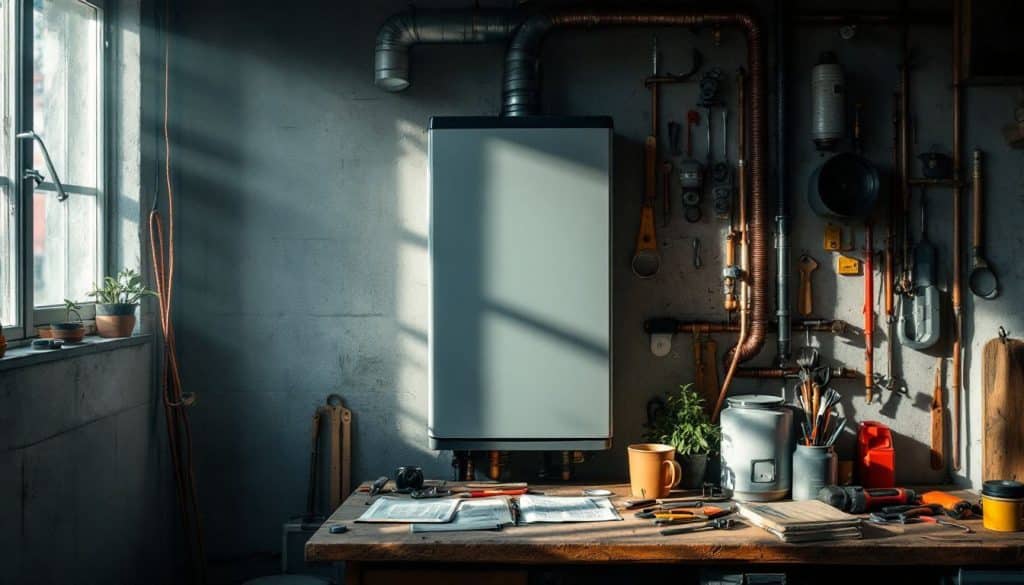
Common boiler problems solved by heat pumps
Heat pumps solve many common boiler problems. They provide reliable heat and hot water. Unlike old boilers, they don’t need frequent repairs, saving us money on maintenance.
We can also enjoy consistent warmth in our homes or businesses.
Another problem with boilers is energy efficiency. Old units use more power, leading to higher fuel bills. Heat pumps use less energy and are better for the environment. They also avoid weird noises and smells that old boilers can make.
Switching to heat pumps means we don’t have to deal with these issues anymore.
Comparison to AC units
Heat pumps are a good replacement for old boilers. They can cool and heat our homes, just like air conditioning units. Many of us find that heat pumps use less energy than traditional systems. This means cheaper fuel bills over time. We enjoy consistent warmth without sudden spikes in cost.
Choosing a heat pump also reduces common boiler problems. Breakdowns are rare because they have fewer moving parts. Regular boiler maintenance is less of a worry, making life easier for all homeowners and business owners alike. Upfront costs may be higher, but the long-term savings make them worth considering over time.
FAQs
When Should I Replace My Boiler Instead of Repairing It
You should replace your boiler if it’s nearing the end of its life. A contractor can check this during an annual inspection.
What are some signs that I need to replace my old boiler?
Look out for frequent breakdowns and high repair costs. If your heating system isn’t working well anymore, it’s time for a new one.
Does a warranty play any role in deciding whether to repair or replace a boiler?
Yes! If your boiler warranty has expired, it might be cheaper to replace it than to fix it.
Is the cost of repairing an old boiler higher than getting a new one?
Yes, often. Repairing an old system can cost more than buying a new, energy-efficient one.
Can HVAC contractors help me decide when to replace my water heater or boiler?
Absolutely! HVAC experts like Raye-Van Enterprises Inc. can check your system and tell you if it needs fixing or replacing.

